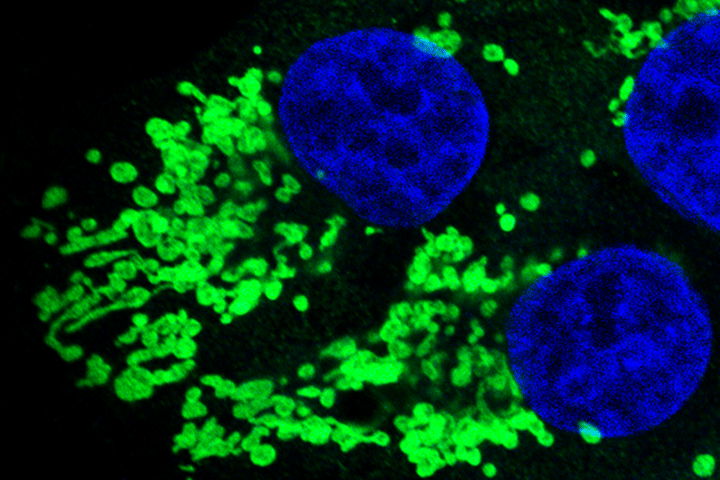Pancreatic Cancer Science—2021 in Review

Courtesy of Carolina Biological Supply Company
As is our custom, it’s time for Let’s Win to take a look at the past year and the achievements made in pancreatic cancer research.
On many fronts, 2021 brought with it some considerable good news for all of us. At the beginning of the pandemic in 2020, many labs closed down—at least for a while—and some clinical trials halted recruiting. By 2021, most labs were back up and running with new schedules and protocols, and clinical trials were open to eligible participants. The widespread availability of COVID-19 vaccinations and boosters in many parts of the world helped to keep severe illness and hospitalizations at bay. And just days before the end of the year, the FDA approved the first COVID antiviral therapy meant to be taken before people are sick enough to be hospitalized.
But 2021 also brought challenges. Recently, right when we thought we were out of the woods by regaining a modicum of “normalcy,” COVID-19 variants began circulating, and it almost feels like we are back at square one. Fortunately, that isn’t true. We have the means to keep ourselves and others healthy through vaccinations, boosters, masking, and social distancing.
And, of course, the most important piece of good news for our Let’s Win community is that pancreatic cancer research continues to forge ahead, creating very real hope that scientists are getting closer to unraveling the complex biology of this disease. This, in turn, will lead to earlier detection and more effective treatments.
Below are just a few of the highlights from 2021. And we are sure 2022 will bring even more innovative scientific discoveries to improve the lives of those with pancreatic cancer.
Personalizing Treatment
A new team of researchers has been formed to predict which treatments might work best for individual pancreatic cancer patients based on the molecular traits of tumors. The Pancreatic Cancer Convergence Dream Team, as it is called, is funded by the Pancreatic Cancer Collective, an initiative of the Lustgarten Foundation and Stand Up To Cancer (SU2C), Stand Up To Cancer Canada, and Pancreatic Cancer Canada.
The five-year survival rate for pancreatic cancer is around 10 percent in the United States and 8 percent in Canada. Additionally, Black people in the U.S. and Canada are more likely to develop pancreatic cancer than whites. In the U.S., the incidence of pancreatic cancer is 19 percent higher in Black men compared to white men, and 36 percent higher in Black women compared to white women. The Dream Team hopes to address this disparity by making recruitment of diverse patients a top priority in their research.
The Dream Team opened a phase II clinical trial called the Pancreatic Adenocarcinoma Signature Stratification for Treatment (PASS-01) trial that looks more closely at the two leading treatments for advanced pancreatic cancer. One of those treatments is modified FOLFIRINOX, which is a combination of four chemotherapy drugs. The other treatment is a combination of chemotherapy drugs gemcitabine and nab-paclitaxel.
The two treatments are helpful for some pancreatic cancer patients but have little effect for others. The goal of the PASS-01 trial is to uncover more about how the two treatments work. Currently, precision medicine for pancreatic cancer patients includes a comprehensive evaluation of the tumor’s genomic profile. But doctors still don’t know enough about the different types of pancreatic cancer to determine whether either treatment will help an individual patient, and if so, which treatment might work best. Building on the findings from a pancreatic cancer clinical trial conducted by the Ontario Institute for Cancer Research—which also is a collaborator on the PASS-01 trial—potential predictors of patient response to chemotherapy will be further tested by Dr. Jennifer Knox (Princess Margaret Cancer Centre, Toronto) and Dr. Elizabeth Jaffee (Sidney Kimmel Comprehensive Cancer Center, Johns Hopkins, Baltimore, Maryland) and their Dream Team colleagues. They also hope the trial will help them learn more about biomarkers within patients’ tumors. Their goal is to be able to identify specific biomarkers that indicate whether an individual’s pancreatic cancer will respond better to one treatment versus the other.
At the same time, the clinical trial will explore another promising method in fighting pancreatic cancer by uncovering the unique characteristics of individual patients’ tumors. Collaborators at Cold Spring Harbor Laboratory in Cold Spring Harbor, New York, will create patient-derived organoids (PDOs) from biopsies of trial participants’ tumors. The miniature 3-D structures are grown in lab dishes from tiny bits of tumors taken from patients. Scientists then see how the PDOs react to different types of cancer drugs. This work may lead to more effective individualized treatments for pancreatic cancer.
ASCO GI 2021: Phase III POLO Trial
In the phase III POLO trial, olaparib was evaluated against a placebo as a maintenance therapy in patients with BRCA1 or BRCA2 mutation-positive metastatic pancreatic cancer. A total of 154 patients whose disease had not progressed during at least 16 weeks of first-line platinum-based chemotherapy were randomly assigned to receive either olaparib or placebo.
Results for overall survival (OS) from randomization to final data cutoff were recently reported. The median OS was 19.0 months with olaparib (median follow-up of 31.3 months) and 19.2 months with placebo (median follow-up of 23.9 months). There was a 17 percent reduction in risk of death with olaparib. In previously published results, progression-free survival (PFS) was 7.4 months in the olaparib group versus 3.8 months in the placebo group at the first data cutoff, a statistically significant difference.
Investigators concluded that the POLO trial maintenance treatment with olaparib provided a significant PFS benefit to patients with BRCA1 or BRCA2 mutation-positive metastatic pancreatic cancer whose disease had not progressed during first-line chemotherapy. PFS data also showed a clear trend in favor of olaparib at the subsequent analysis—16.0 months for olaparib versus 9.3 months for the placebo.
Accelerating the Pace of Discovery
The Lustgarten Foundation initiated a new research program called the Clinical Accelerator Initiative, which helps to ensure the most pioneering research advancements in early detection and new treatments are made available to patients as soon as possible.
The Clinical Accelerator Initiative focuses on launching new clinical studies in a way that shortens the time required to move from concept to study launch. And it also helps to develop smarter clinical trials that generate as much data as possible to assist in improving patient outcomes.
Lustgarten established a Translational Advisory Group (TAG) consisting of renowned experts to implement the Clinical Accelerator Initiative. The TAG is identifying the most innovative concepts and potential therapeutic approaches for all stages of pancreatic cancer and accelerating the testing of these new concepts. The team is led by Dr. Jaffee, Lustgarten’s Chief Medical Advisor.
In early 2021, the Foundation approved $5.1 million to fund three new clinical studies under the Clinical Accelerator Initiative. Two studies at Johns Hopkins will build on work coming from Jaffee’s team exploring the use of vaccines in the treatment of pancreatic cancer. Both newly-funded studies will look at novel combinations of vaccines and drugs targeting the immune system to determine if they can overcome pancreatic tumors’ resistance to immune therapies. The two studies build on clinical data generated in ongoing clinical trials at Johns Hopkins and will target specific immune barriers identified as part of those studies. One study will enroll metastatic patients while the other will target patients who are eligible for surgery.
The third study, at Dana-Farber Cancer Institute (Boston), will look to “reawaken” T cells (an immune system cell) that penetrate the pancreatic tumors but are rendered “exhausted” and ineffective by signals from the tumor. The clinical study will test a novel combination of drugs designed to simultaneously activate the T cells and block the inhibitory signals from the tumor.
Increasing Diversity
The Lustgarten Foundation and the American Association for Cancer Research (AACR) have established two new career development awards, one for early-career female researchers, the other for underrepresented pancreatic cancer researchers, with a generous commitment from the Lustgarten Foundation of up to $1.8 million. The awards will honor the lives and legacies of United States Supreme Court Justice Ruth Bader Ginsburg and civil rights icon and 17-term Georgia Congressman John Robert Lewis, two influential and inspiring public figures who died of pancreatic cancer in 2020. Dannielle Engle, Ph.D., of the Salk Institute for Biological Studies in La Jolla, California, and Avery D. Posey, Ph.D., of the Perelman School of Medicine at the University of Pennsylvania, were announced as the inaugural recipients of these prestigious awards at the AACR Annual Meeting 2021.
Reaching the Underserved
Let’s Win continues its efforts to reach underserved patients with pancreatic cancer, through social media outreach, with stories on important topics like diversity in clinical trials and the relationship between diabetes and pancreatic cancer. Other forms of outreach include webinars and presentations to diverse groups of community health workers, diabetes educators, patients, and caregivers focused on risk factors, symptoms, treatments, the importance of clinical trials, and the relationship between diabetes and pancreatic cancer.
Going Virtual
The AACR Virtual Special Conference: Pancreatic Cancer was again held remotely this year. Nonetheless, the two-day program brought together world-renowned experts who addressed the latest developments in pancreatic cancer research, spanning basic, translational, and clinical research areas. The program focused on incorporating numerous talks from submitted abstracts to highlight the advancements in and diversity of the pancreatic cancer research field. The program included a keynote address on Molecular subtypes and vulnerabilities in pancreatic cancer given by Andrew J. Aguirre, M.D., Ph.D., Dana-Farber. Another keynote address, Using an integrative molecular epidemiology approach to battle pancreatic cancer in the era of precision medicine: Hope is on the horizon, was given by Jennifer Permuth, Ph.D., M.S., Moffitt Cancer Center, Tampa, Florida. Sessions included talks on immunotherapy, big data, metabolism and RAS signaling, the tumor microenvironment, and more.
The Power of Twitter
PancChat remains the linchpin of our social media program. The Twitter chat allows clinicians, researchers, and patients to interact in real time. Topics in 2021 included cachexia, radiation oncology, the role of exercise in treatment and recovery, and hereditary/familial pancreatic cancer. In 2022, cohosts including Dr. Allyson Ocean and Dr. Shaalan Beg plan to publish a paper on the power of PancChat as a social media outreach tool.






